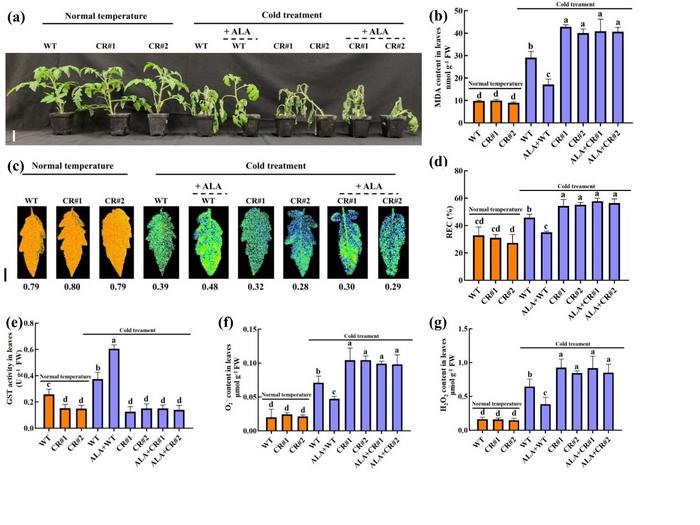Low temperature stress, as one of the main abiotic stresses, severely hinders plant growth and has adverse effects on crop yield and quality. 5-Aminolevulinic acid (ALA), a growth regulator widely present in animals and plants, has been extensively utilized in plant cold resistance processes due to its efficient, non-toxic, and easily degradable characteristics. However, most of the current research related to ALA mainly focuses on the regulation network’s end point. The specific molecular mechanism of ALA in early plant cold resistance is still unclear and requires further research by scientists.

Credit: Horticulture Research
Low temperature stress, as one of the main abiotic stresses, severely hinders plant growth and has adverse effects on crop yield and quality. 5-Aminolevulinic acid (ALA), a growth regulator widely present in animals and plants, has been extensively utilized in plant cold resistance processes due to its efficient, non-toxic, and easily degradable characteristics. However, most of the current research related to ALA mainly focuses on the regulation network’s end point. The specific molecular mechanism of ALA in early plant cold resistance is still unclear and requires further research by scientists.
In January 2024, Horticulture Research published a research paper titled “5-Aminolevulinic acid improves cold resistance through regulation of SlMYB4/SlMYB88-SlGSTU43 module to scavenge reactive oxygen species in tomato,” completed by the team led by Hu Xiaohui from Northwest A&F University.
In this study, a glutathione S-transferase gene, SlGSTU43, was identified in tomato (Solanum lycopersicum L.). The research results indicate that ALA strongly induces the expression of SlGSTU43 under cold stress. Transgenic tomato lines overexpressing SlGSTU43 exhibited significantly enhanced ability to scavenge reactive oxygen species, showing clear resistance to low-temperature stress, whereas mutant lines of SlGSTU43 were sensitive to low-temperature stress. Furthermore, the study results demonstrate that ALA did not enhance the tolerance of the mutant lines to low-temperature stress. Therefore, the research suggests that SlGSTU43 is an important gene in the process of ALA improving cold resistance in tomatoes (Fig. 1).
Furthermore, the study verified through EMSA, Y1H, LUC, and ChIP-qPCR assays that SlMYB4 and SlMYB88 can regulate the expression of SlGSTU43 by binding to its promoter. Further experiments demonstrated that SlMYB4 and SlMYB88 are also involved in the process of ALA enhancing tomato’s tolerance to low-temperature stress, positively regulating the expression of SlGSTU43 (Fig. 2). These findings provide new insights into the mechanism by which ALA enhances tomato’s tolerance to low-temperature stress.
###
References
Authors
Zhengda Zhang, Luqiao Yuan , Jiao Dang, Yuhui Zhang, Yongshuai Wen, Yu Du, Yufei Liang, Ya Wang, Tao Liu, Tianlai Li, Xiaohui Hu
Affiliations
College of Horticulture, Northwest A&F University
About Zhengda Zhang
College of Horticulture, Northwest A&F University, Professor/Doctoral Supervisor, Scientist of China Agriculture Research System (Vegetable), Shaanxi Vegetable Industry Technology System Scientist. She engaged in plant physiology of abiotic stress,technology of efficient production on protected vegetable, and automatic management of greenhouse, the main research crops are tomatoes and cucumbers.
Journal
Horticulture Research
DOI
10.1093/hr/uhae026
Method of Research
Experimental study
Subject of Research
Not applicable
Article Title
5-Aminolevulinic acid improves cold resistance through regulation of SlMYB4/SlMYB88-SlGSTU43 module to scavenge reactive oxygen species in tomato
Article Publication Date
19-Jan-2024
COI Statement
The authors declare that they have no competing interests.




